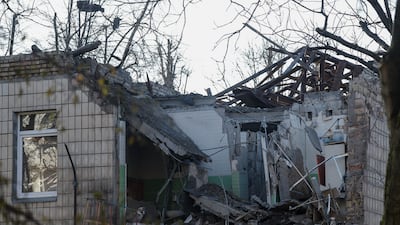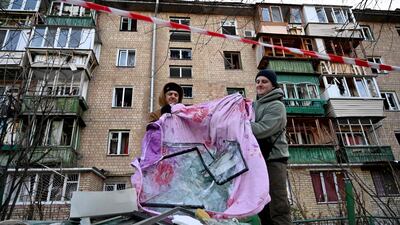Supermarket versions of drones are, undoubtedly, the battlefield development of the current decade.
Not only do drones allow frontline commanders to view enemy hills with the kinds of camera devices we all can buy, but even quadcopter devices on stacking shelves near us can be fairly easily adapted to deliver deadly outcomes. This has shaken up warfighting in a way that only happens every couple of decades.
It is arguable that the last such innovation was the vehicle-borne or roadside bomb. Before that, it was the Soviet assault rifle – better known as the AK-47 – which put a reliable fast-firing device into the hands of hundreds of millions of people.
The thing about drones is not just the dangers they pose in the theatre of war. It is that they have shifted alliances between countries.
A knock-on effect of the proliferation of drones is the normalisation of their sales even if it means bypassing the UN sanctions framework. So fast is the situation changing that it is possible to say that the global regime has been rendered non-functional – something that will have huge implications for international relations.
Once the principal parties to the UN sanctions stop adhering to them, previous issues with non-compliance by certain countries will be magnified. There is a concern that the whole edifice that allows the UN to enforce the will of the Security Council is now in tatters. And it is the rise of the drone that has finally pushed it over the edge.
The drone itself is a lawless intruder into the world of war. That in and of itself is having a significant impact that will be felt for years to come.
The sales of the Shahed to Russia crossed a significant global Rubicon
In a paper last week, the UK’s Royal United Services Institute (Rusi) examined the landscape around the Lethal Autonomous Weapons Systems, or “Laws”. This landscape includes drones, given that their use is increasingly removed from human direction.
The most basic drones, whether autonomous or not, pose an enormous proliferation risk not only as a result of more countries snapping up the capability but also because they are within the reach of rebels, terrorist groups and criminal networks. This feels like a new thing, but the report cites an incident during the 2016 fighting in Mosul when ISIS mounted 70 armed drones to stop an offensive by the Iraqi forces.
The drones employed can vary enormously.
There are those that are factory-made as well as workshop-produced. They may vary in reliability and effectiveness, but their key attribute – regardless of these variations – is that they can be used for mass attacks to overwhelm unprepared defence systems.
The second tier comprises of military-grade, off-the-shelf weapons that an increasing number of states are producing and selling around the world.
The ranks of notable ground-breaking weapons systems are growing, as the impact of these devices spreads. These, too, boast the qualities of mass-scale deployment, and if procured from a top producer, are likely to boast advanced technology, including autonomous operation.
A final category that Rusi has identified comprises of high-impact, boutique weapons systems that are developed and traded only between a few privileged states.
The report points to the call by UN Secretary General Antonio Guterres last year for a drive to ensure that there are legally binding international laws with restrictions on autonomous weapons, including bans in certain areas, by 2026. There is already a Convention on Certain Conventional Weapons, designed against weapons that cause unnecessary or unjustifiable suffering, that has been ratified by 126 states.
The Ukraine war has highlighted to the world what was already a dangerous turn of events in Yemen. Iranian-made drones, particularly the Shahed-136, is an engine-driven drone that has been transferred by the hundreds from Iran to Russia.
The attacks on the Red Sea that forced the US and UK to take action to protect international freedom of navigation have seen Houthi bases targeted by air and missile strikes. This situation would not have come about without international proliferation, as Iran sought first to destabilise its neighbourhood. Now that this capacity exists, it has been turned to target the international economy and destabilise the world order.
The sales of the Shahed to Russia crossed a significant global Rubicon: a permanent member of the UN Security Council was willing to buy weapons systems at scale from a country that was the target of extensive UN sanctions.
Iran has an extensive missile development programme. Until recently, it was the international community’s shared priority to not only ensure that Tehran could not make revenues from the sales of these systems but to also ensure that it was starved of parts to develop its capabilities any faster than it was already on track to complete.
Now, there is news that the arms embargo around North Korea has developed cracks and weapons are being sold for the Ukraine war effort, too. This is, if anything, even more significant than the sale of Iranian drones.
The West will come under even greater pressure to use sanctions and economic tools to try to contain this destructive breakdown.
UN sanctions were once almost universally enforced, but increasingly more countries are refusing to replicate western-led sanctions that are issued on a weekly basis these days. These countries point to the dividing lines created by unilateral measures.
We can see that, as the respect for sanctions is breaking down, the likes of North Korea are beefing up their proliferation activities and posting key personnel around the world for this purpose.
All this means that the interlinkage between revived proliferation and the collapse of the international system could only be getting started.
Specs
Engine: Electric motor generating 54.2kWh (Cooper SE and Aceman SE), 64.6kW (Countryman All4 SE)
Power: 218hp (Cooper and Aceman), 313hp (Countryman)
Torque: 330Nm (Cooper and Aceman), 494Nm (Countryman)
On sale: Now
Price: From Dh158,000 (Cooper), Dh168,000 (Aceman), Dh190,000 (Countryman)
Our legal consultants
Name: Hassan Mohsen Elhais
Position: legal consultant with Al Rowaad Advocates and Legal Consultants.
RESULTS
Manchester United 2
Anthony Martial 30'
Scott McTominay 90 6'
Manchester City 0
Benefits of first-time home buyers' scheme
- Priority access to new homes from participating developers
- Discounts on sales price of off-plan units
- Flexible payment plans from developers
- Mortgages with better interest rates, faster approval times and reduced fees
- DLD registration fee can be paid through banks or credit cards at zero interest rates
Three ways to boost your credit score
Marwan Lutfi says the core fundamentals that drive better payment behaviour and can improve your credit score are:
1. Make sure you make your payments on time;
2. Limit the number of products you borrow on: the more loans and credit cards you have, the more it will affect your credit score;
3. Don't max out all your debts: how much you maximise those credit facilities will have an impact. If you have five credit cards and utilise 90 per cent of that credit, it will negatively affect your score.
Miss Granny
Director: Joyce Bernal
Starring: Sarah Geronimo, James Reid, Xian Lim, Nova Villa
3/5
(Tagalog with Eng/Ar subtitles)
Ferrari 12Cilindri specs
Engine: naturally aspirated 6.5-liter V12
Power: 819hp
Torque: 678Nm at 7,250rpm
Price: From Dh1,700,000
Available: Now
Tips for newlyweds to better manage finances
All couples are unique and have to create a financial blueprint that is most suitable for their relationship, says Vijay Valecha, chief investment officer at Century Financial. He offers his top five tips for couples to better manage their finances.
Discuss your assets and debts: When married, it’s important to understand each other’s personal financial situation. It’s necessary to know upfront what each party brings to the table, as debts and assets affect spending habits and joint loan qualifications. Discussing all aspects of their finances as a couple prevents anyone from being blindsided later.
Decide on the financial/saving goals: Spouses should independently list their top goals and share their lists with one another to shape a joint plan. Writing down clear goals will help them determine how much to save each month, how much to put aside for short-term goals, and how they will reach their long-term financial goals.
Set a budget: A budget can keep the couple be mindful of their income and expenses. With a monthly budget, couples will know exactly how much they can spend in a category each month, how much they have to work with and what spending areas need to be evaluated.
Decide who manages what: When it comes to handling finances, it’s a good idea to decide who manages what. For example, one person might take on the day-to-day bills, while the other tackles long-term investments and retirement plans.
Money date nights: Talking about money should be a healthy, ongoing conversation and couples should not wait for something to go wrong. They should set time aside every month to talk about future financial decisions and see the progress they’ve made together towards accomplishing their goals.
Pharaoh's curse
British aristocrat Lord Carnarvon, who funded the expedition to find the Tutankhamun tomb, died in a Cairo hotel four months after the crypt was opened.
He had been in poor health for many years after a car crash, and a mosquito bite made worse by a shaving cut led to blood poisoning and pneumonia.
Reports at the time said Lord Carnarvon suffered from “pain as the inflammation affected the nasal passages and eyes”.
Decades later, scientists contended he had died of aspergillosis after inhaling spores of the fungus aspergillus in the tomb, which can lie dormant for months. The fact several others who entered were also found dead withiin a short time led to the myth of the curse.
Notable salonnières of the Middle East through history
Al Khasan (Okaz, Saudi Arabia)
Tamadir bint Amr Al Harith, known simply as Al Khasan, was a poet from Najd famed for elegies, earning great renown for the eulogy of her brothers Mu’awiyah and Sakhr, both killed in tribal wars. Although not a salonnière, this prestigious 7th century poet fostered a culture of literary criticism and could be found standing in the souq of Okaz and reciting her poetry, publicly pronouncing her views and inviting others to join in the debate on scholarship. She later converted to Islam.
Maryana Marrash (Aleppo)
A poet and writer, Marrash helped revive the tradition of the salon and was an active part of the Nadha movement, or Arab Renaissance. Born to an established family in Aleppo in Ottoman Syria in 1848, Marrash was educated at missionary schools in Aleppo and Beirut at a time when many women did not receive an education. After touring Europe, she began to host salons where writers played chess and cards, competed in the art of poetry, and discussed literature and politics. An accomplished singer and canon player, music and dancing were a part of these evenings.
Princess Nazil Fadil (Cairo)
Princess Nazil Fadil gathered religious, literary and political elite together at her Cairo palace, although she stopped short of inviting women. The princess, a niece of Khedive Ismail, believed that Egypt’s situation could only be solved through education and she donated her own property to help fund the first modern Egyptian University in Cairo.
Mayy Ziyadah (Cairo)
Ziyadah was the first to entertain both men and women at her Cairo salon, founded in 1913. The writer, poet, public speaker and critic, her writing explored language, religious identity, language, nationalism and hierarchy. Born in Nazareth, Palestine, to a Lebanese father and Palestinian mother, her salon was open to different social classes and earned comparisons with souq of where Al Khansa herself once recited.
Killing of Qassem Suleimani
Company profile
Name: Thndr
Started: October 2020
Founders: Ahmad Hammouda and Seif Amr
Based: Cairo, Egypt
Sector: FinTech
Initial investment: pre-seed of $800,000
Funding stage: series A; $20 million
Investors: Tiger Global, Beco Capital, Prosus Ventures, Y Combinator, Global Ventures, Abdul Latif Jameel, Endure Capital, 4DX Ventures, Plus VC, Rabacap and MSA Capital
Specs
Engine: Dual-motor all-wheel-drive electric
Range: Up to 610km
Power: 905hp
Torque: 985Nm
Price: From Dh439,000
Available: Now
UAE currency: the story behind the money in your pockets
The specs: 2018 Renault Koleos
Price, base: From Dh77,900
Engine: 2.5L, in-line four-cylinder
Transmission: Continuously variable transmission
Power: 170hp @ 6,000rpm
Torque: 233Nm @ 4,000rpm
Fuel economy, combined: 8.3L / 100km
MATCH INFO
Who: France v Italy
When: Friday, 11pm (UAE)
TV: BeIN Sports
Why are asylum seekers being housed in hotels?
The number of asylum applications in the UK has reached a new record high, driven by those illegally entering the country in small boats crossing the English Channel.
A total of 111,084 people applied for asylum in the UK in the year to June 2025, the highest number for any 12-month period since current records began in 2001.
Asylum seekers and their families can be housed in temporary accommodation while their claim is assessed.
The Home Office provides the accommodation, meaning asylum seekers cannot choose where they live.
When there is not enough housing, the Home Office can move people to hotels or large sites like former military bases.
if you go
Volvo ES90 Specs
Engine: Electric single motor (96kW), twin motor (106kW) and twin motor performance (106kW)
Power: 333hp, 449hp, 680hp
Torque: 480Nm, 670Nm, 870Nm
On sale: Later in 2025 or early 2026, depending on region
Price: Exact regional pricing TBA
Israel Palestine on Swedish TV 1958-1989
Director: Goran Hugo Olsson
Rating: 5/5
UAE cricketers abroad
Sid Jhurani is not the first cricketer from the UAE to go to the UK to try his luck.
Rameez Shahzad Played alongside Ben Stokes and Liam Plunkett in Durham while he was studying there. He also played club cricket as an overseas professional, but his time in the UK stunted his UAE career. The batsman went a decade without playing for the national team.
Yodhin Punja The seam bowler was named in the UAE’s extended World Cup squad in 2015 despite being just 15 at the time. He made his senior UAE debut aged 16, and subsequently took up a scholarship at Claremont High School in the south of England.
The specs
Engine: 8.0-litre, quad-turbo 16-cylinder
Transmission: 7-speed auto
0-100kmh 2.3 seconds
0-200kmh 5.5 seconds
0-300kmh 11.6 seconds
Power: 1500hp
Torque: 1600Nm
Price: Dh13,400,000
On sale: now
Killing of Qassem Suleimani
More on Quran memorisation:














